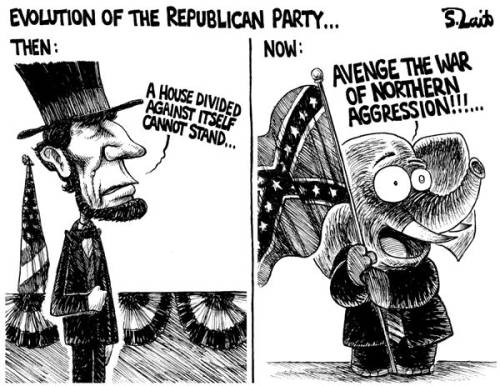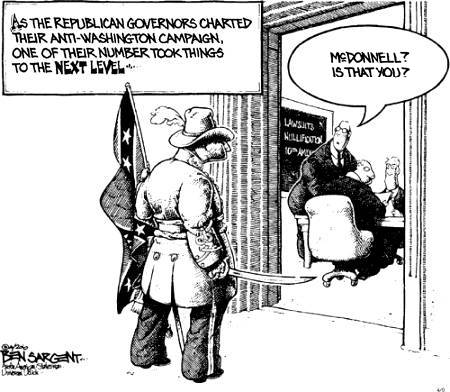You are using an out of date browser. It may not display this or other websites correctly.
You should upgrade or use an alternative browser.
You should upgrade or use an alternative browser.
Were Confederate soldiers terrorists?
- Thread starter signalmankenneth
- Start date
Dixie - In Memoriam
New member
The vast majority of soldiers who fought for the south were not rich plantation/slave owners. They were poor dirt farmers who were duped into fighting for the profits of the slave owners. They died for profits for the rich. Hate propaganda worked then too.
In order to be "duped into" something, it requires that you make the choice to be involved in something. Southern boys didn't have the luxury of choice. It wasn't a matter of being "duped into" going to war, as much as it was just what honorable men did. Perhaps you can say it was a different time and people held different views than today, but there wasn't a "conscience objector" status back then, you were either "honorable" or you were a "coward" and that is just how it was.
Dixie - In Memoriam
New member
I've always felt that "civil war" is a dumb, albeit convenient, term. For it to be a true civil war, both sides would have to have been competing for control over Washington, DC. I'll admit that when many Southerners insist on calling it "The War Between the States," that they have a point. The war was more accurately a rebellion/revolution (revolutions have to be successful in order to be accorded the term in history, though...).
For example, the English Civil War was faught between Puritan and Royalist forces fighting for control of England. It ended with King Charles I executed for "treason" and beheaded, and the Puritans in power in London with Oliver Cromwell set up as the Lord Protector of the new Commonwealth.
Regardless of your feelings, it was indeed a "civil war" in every sense of the term. It was a conflict between two internal factions of the same country. The South most certainly desired control over Washington D.C.
The only reason I don't call it "War Between the States" is because that is too long to type, and "the WBS" sounds like a TV network. We can call it the Civil War, or American Civil War, and I am fine with that title. It was a war between the states, and it's important that we remember this... all soldiers were Americans.
As for people who were executed for treason and beheaded in the past, I suppose that is great example of how we "grew and learned" from history.
Airstrip One
Completely Effed
But there were conscientious objectors:
Conscientious objector - Wikipedia, the free encyclopedia@@AMEPARAM@@/wiki/File:Question_book-new.svg" class="image"><img alt="Question book-new.svg" src="http://upload.wikimedia.org/wikipedia/en/thumb/9/99/Question_book-new.svg/50px-Question_book-new.svg.png"@@AMEPARAM@@en/thumb/9/99/Question_book-new.svg/50px-Question_book-new.svg.png
Conscientious objectors in Confederate States initially had few options. Responses included moving to northern states, hiding in the mountains, joining the army but refusing to use a weapon or imprisonment. Between late 1862 and 1864 a payment of $500 into the public treasury exempted conscientious objectors from Confederate military duty.
Conscientious objector - Wikipedia, the free encyclopedia@@AMEPARAM@@/wiki/File:Question_book-new.svg" class="image"><img alt="Question book-new.svg" src="http://upload.wikimedia.org/wikipedia/en/thumb/9/99/Question_book-new.svg/50px-Question_book-new.svg.png"@@AMEPARAM@@en/thumb/9/99/Question_book-new.svg/50px-Question_book-new.svg.png
Conscientious objectors in Confederate States initially had few options. Responses included moving to northern states, hiding in the mountains, joining the army but refusing to use a weapon or imprisonment. Between late 1862 and 1864 a payment of $500 into the public treasury exempted conscientious objectors from Confederate military duty.
W
WinterBorn
Guest
But there were conscientious objectors:
Conscientious objector - Wikipedia, the free encyclopedia
Conscientious objectors in Confederate States initially had few options. Responses included moving to northern states, hiding in the mountains, joining the army but refusing to use a weapon or imprisonment. Between late 1862 and 1864 a payment of $500 into the public treasury exempted conscientious objectors from Confederate military duty.
A conscientious objector during the civil war would have had to move away and never contact home again.
They would have been run out of town on a rail after being tarred & feathered.
DamnYankee
Loyal to the end
Its possible that the Republicans would never had won be it for the support of the mountain folk of The South, of Scots-Irish and German ancestry who hated the wealthy Democrats down east, slavers of English ancestry.
W
WinterBorn
Guest
Its possible that the Republicans would never had won be it for the support of the mountain folk of The South, of Scots-Irish and German ancestry who hated the wealthy Democrats down east, slavers of English ancestry.
The Union won the war. The United States of America won the war. The republicans didn't win the war.
Airstrip One
Completely Effed
Regardless of your feelings, it was indeed a "civil war" in every sense of the term. It was a conflict between two internal factions of the same country. The South most certainly desired control over Washington D.C.
The only reason I don't call it "War Between the States" is because that is too long to type, and "the WBS" sounds like a TV network. We can call it the Civil War, or American Civil War, and I am fine with that title. It was a war between the states, and it's important that we remember this... all soldiers were Americans.
As for people who were executed for treason and beheaded in the past, I suppose that is great example of how we "grew and learned" from history.
Um, you may recall a completely separate country called the CSA. I believe you recently posted its idiotic flag to your avatar recently? The War of Southern Secession was faught between the United States of America (Washington, DC) and the Confederate States of America (Montgomery/Richmond). It was not an internal conflict, and the South was fighting to maintain the legitimacy of the Richmond government rather than to govern itself (and the North) from Washington, DC under the US Flag.
Dixie - In Memoriam
New member
Um, you may recall a completely separate country called the CSA. I believe you recently posted its idiotic flag to your avatar recently? The War of Southern Secession was faught between the United States of America (Washington, DC) and the Confederate States of America (Montgomery/Richmond). It was not an internal conflict, and the South was fighting to maintain the legitimacy of the Richmond government rather than to govern itself (and the North) from Washington, DC under the US Flag.
The CSA was formed AFTER the states seceded from the USA. The war was fought between Northern and Southern states of the United States. It was an internal conflict, the reasons and issues were internal, and it is beyond ignorant to be claiming that not to be the case. Had the South won the war, it would have included taking the capitol and the country we now live in would be called the Confederate States of America. Or perhaps they would have come up with another name? Maybe we would be called the United Confederation of States? The "what ifs" really make no difference here, it was a war between Northern and Southern states of the same nation. The CSA's existence was only to facilitate a unification under a common flag.
signalmankenneth
Verified User
DamnYankee
Loyal to the end
The Republicans certainly did win the war. And we kicked Democrat asses with the help of our counterparts in the Carolinas along with our friends of African ancestry.
W
WinterBorn
Guest
The Republicans certainly did win the war. And we kicked Democrat asses with the help of our counterparts in the Carolinas along with our friends of African ancestry.
Considering there were almost 1.4 million votes cast members of the Northern Democrat Party, the republicans most certainly did not win the war.
The Union Army, and citizens of the United States won the war. Your attempt to claim that the entire north was republican is no more accurate than your claim that the piedmont region of NC had no slaves because they "wanted nothing to do with it".
Dixie - In Memoriam
New member
Considering there were almost 1.4 million votes cast members of the Northern Democrat Party, the republicans most certainly did not win the war.
The Union Army, and citizens of the United States won the war. Your attempt to claim that the entire north was republican is no more accurate than your claim that the piedmont region of NC had no slaves because they "wanted nothing to do with it".
There were very few southern republicans, they mostly came from the northern states. As for who had slaves, NO ONE had slaves because they "wanted something to do with it" ...slavery wasn't because people liked owning other people! As I stated before, people owned slaves because that was how you harvested cotton, and the US Government and Supreme Court, had ordained the institution and established it as law of the land. People who didn't own slaves were not automatically opposed to slavery or supportive of Civil Rights for slaves, they simply didn't have a need to own slaves because they didn't have cotton to harvest. Had cotton grown in Pennsylvania, they would have had just as many slaves as any southern state, the circumstances of who owned slaves was related directly to the climate, not social viewpoints on equality of race!
W
WinterBorn
Guest
There were very few southern republicans, they mostly came from the northern states. As for who had slaves, NO ONE had slaves because they "wanted something to do with it" ...slavery wasn't because people liked owning other people! As I stated before, people owned slaves because that was how you harvested cotton, and the US Government and Supreme Court, had ordained the institution and established it as law of the land. People who didn't own slaves were not automatically opposed to slavery or supportive of Civil Rights for slaves, they simply didn't have a need to own slaves because they didn't have cotton to harvest. Had cotton grown in Pennsylvania, they would have had just as many slaves as any southern state, the circumstances of who owned slaves was related directly to the climate, not social viewpoints on equality of race!
Imagine that!
Airstrip One
Completely Effed
Considering there were almost 1.4 million votes cast members of the Northern Democrat Party, the republicans most certainly did not win the war.
The Union Army, and citizens of the United States won the war. Your attempt to claim that the entire north was republican is no more accurate than your claim that the piedmont region of NC had no slaves because they "wanted nothing to do with it".
1.4 million unpatriotic sellouts, who largely opposed the war, giving birth to the name War Democrats. 1.4 million is also an insignificant number when you consider the total population of the Northern States.
Airstrip One
Completely Effed
There were very few southern republicans, they mostly came from the northern states. As for who had slaves, NO ONE had slaves because they "wanted something to do with it" ...slavery wasn't because people liked owning other people! As I stated before, people owned slaves because that was how you harvested cotton, and the US Government and Supreme Court, had ordained the institution and established it as law of the land. People who didn't own slaves were not automatically opposed to slavery or supportive of Civil Rights for slaves, they simply didn't have a need to own slaves because they didn't have cotton to harvest. Had cotton grown in Pennsylvania, they would have had just as many slaves as any southern state, the circumstances of who owned slaves was related directly to the climate, not social viewpoints on equality of race!
Or, alternatively, the people of the North were simply better people. Stronger morals, deeper faith, less prone to hypocracy, more patriotic, more individualistic, capitalists, and so forth.
W
WinterBorn
Guest
1.4 million unpatriotic sellouts, who largely opposed the war, giving birth to the name War Democrats. 1.4 million is also an insignificant number when you consider the total population of the Northern States.
1.4 million voted for the Northern Democratic Party nominee. 1.8 million voted for Lincoln. Only a bit under 4.7 million people voted in the presidential election.
While 1.4 million Northern Democrats was not enough to win the election. It does show that the republicans did not win the war, as was claimed.
Airstrip One
Completely Effed
1.4 million voted for the Northern Democratic Party nominee. 1.8 million voted for Lincoln. Only a bit over 4.7 million people voted in the presidential election.
While 1.4 million Northern Democrats was not enough to win the election. It does show that the republicans did not win the war, as was claimed.
Yes, they did. The Northern Dems attempted to undermine the war, by doing such things as voting for Clement Vallandigham in Ohio.
Clement Vallandigham - Wikipedia, the free encyclopedia@@AMEPARAM@@/wiki/File:Clement_Vallandigham_-_Brady-Handy.jpg" class="image" title="Clement Vallandigham"><img alt="" src="http://upload.wikimedia.org/wikipedia/commons/thumb/9/9b/Clement_Vallandigham_-_Brady-Handy.jpg/160px-Clement_Vallandigham_-_Brady-Handy.jpg"@@AMEPARAM@@commons/thumb/9/9b/Clement_Vallandigham_-_Brady-Handy.jpg/160px-Clement_Vallandigham_-_Brady-Handy.jpg
Then there was the Northern Democratic bid for the presidency in 1864, which featured the inept Gen. George B. McClellan and an anti-war platform promising to end the war immediately.
Airstrip One
Completely Effed
From the Wiki article above:
Vallandigham died in 1871 in Lebanon, Ohio, at the age of 50, after accidentally shooting himself with a pistol.
Oh, fuck yes, that is hilarious! What a dumbass!!
Vallandigham died in 1871 in Lebanon, Ohio, at the age of 50, after accidentally shooting himself with a pistol.
Oh, fuck yes, that is hilarious! What a dumbass!!
Dixie - In Memoriam
New member
Or, alternatively, the people of the North were simply better people. Stronger morals, deeper faith, less prone to hypocracy, more patriotic, more individualistic, capitalists, and so forth.
It had nothing to do with "better people" or "stronger morals" and nothing to do with faith, hypocrisy, or patriotism. That is what you've told yourself, that is the lie you want to believe in bigoted ignorance, but that is not the truth. The North was more industrialized because they couldn't grow things well, and the South wasn't as industrialized, because they were well suited for agriculture. This didn't have a thing to do with intelligence, capitalism, or desire to industrialize, it was just the nature of things in that time. Southerners made far more profit from King Cotton, than ANY industrialization effort they could have embarked upon, and if they did... who would have supplied the HUGE demand for cotton? The #1 leading industry in the North, was textiles... made from COTTON! We harvest Lobsters from Maine... we don't do so in Alabama... there is a reason, and it has nothing to do with culture, or whether Alabamians like or dislike Lobster. We grow oranges in California and Florida, Wisconsin doesn't grow oranges... not because Wisconsin doesn't like oranges, or is too ignorant to learn how to grow oranges, but because it's not suitable climate to grow oranges. The South grew cotton in the 1860s, because the climate in the South was suitable to grow cotton... and the method of harvesting the cotton was slavery.




